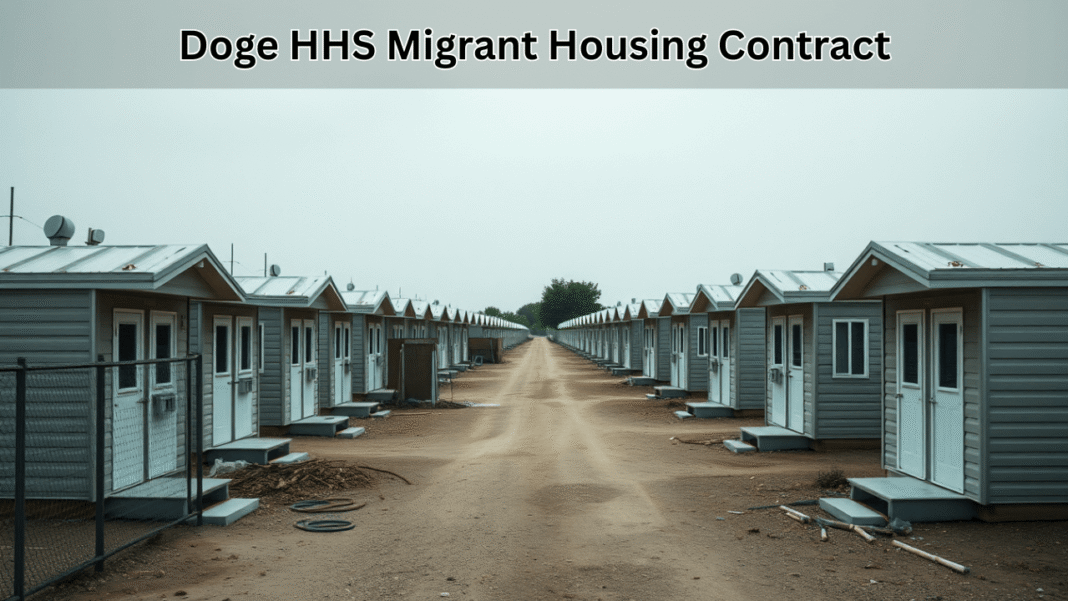Well, here we are—another massive government contract goes bust, and this time, it’s the $18 million Doge HHS migrant housing contract that’s making headlines. If you’ve been following the buzz, you probably already know the basics: a deal designed to support migrants in crisis has crumbled under the weight of mismanagement, broken promises, and an avalanche of controversy. Let’s break it down, Anderson Cooper-style—direct, human, and real.
What Was the Doge HHS Migrant Housing Contract All About?
So, the Doge HHS migrant housing contract wasn’t just a fancy paper deal. It was supposed to be a serious response to a serious issue—helping migrants find temporary housing and essential services while their asylum or immigration status was being processed in the U.S.
The Department of Health and Human Services (HHS) awarded Doge an $18 million contract to make it all happen. The blueprint? Secure livable spaces, provide food, medical support, and legal aid. You know, the basics of human dignity.
But things started unraveling… fast.
Red Flags and Rising Doubts
From the start, some eyebrows were raised. People questioned whether Doge, the main player in the Doge HHS migrant housing contract, had the muscle—or the experience—to pull off such a high-stakes operation.
Then came the regulatory concerns. Reports trickled in pointing to poor facility conditions. Think: questionable sanitation, subpar safety, and accommodations that didn’t quite match the promised standards.
Add to that whispers about financial mismanagement and you’ve got yourself a recipe for disaster. The numbers just didn’t add up, and neither did the logistics.
Transparency? Not So Much
Critics of the Doge HHS migrant housing contract were loud and clear: the process felt murky. Was the bidding process fair? Were there favorites being played? Allegations of favoritism and backdoor dealing started making rounds—and suddenly, this wasn’t just about missed targets, but broken trust.
When public money is on the line—$18 million of it—people expect clarity, and rightly so. But what they got was a thick fog of confusion and concern.
Amidst this chaos, the Doge HHS contract isn’t the only federal project hitting turbulence. Similar issues have surfaced in other sectors, like the FDA’s recent warning letter to KVK-Tech, which exposed major operational setbacks and compliance failures. Just like the Doge HHS case, these instances highlight the critical importance of accountability, transparency, and strict adherence to federal standards. You can read more about it in our detailed coverage: KVK-Tech Warning Letter by FDA: Major Setbacks Revealed.
The Implosion: Why the Contract Was Terminated

Let’s be real—contracts don’t collapse overnight. The fall of the Doge HHS migrant housing contract was more of a slow-motion train wreck.
First came compliance issues. Facilities didn’t meet federal safety standards. Then financial red flags—misallocation of funds, unclear spending, and zero clarity on how resources were being used. That’s when watchdogs and advocacy groups started making noise.
Operational failures followed—delays in getting services off the ground, inadequate support, logistical nightmares… the list goes on. Eventually, HHS had to pull the plug. Too many fires, not enough water.
What Happens to the Migrants Now?
And here’s where it gets painful. The collapse of the Doge HHS migrant housing contract didn’t just mean a failed deal—it meant real people were left in limbo.
Families that were relying on promised shelter and support were now scrambling for basic needs. Community organizations—bless them—stepped in with what they had: donated clothes, food drives, and volunteer medical support.
But let’s be honest—grassroots groups, while heroic, aren’t built to carry the weight of a failed federal contract. They’re doing what they can, but there’s a serious gap, and no quick fix in sight.
The Response: Doge Speaks, HHS Reacts
In the aftermath, Doge tried to save face. They released a carefully worded statement talking about their “commitment” and “disappointment” over how things played out. They claimed the project’s scale made it complicated—which, sure, it probably did—but complications aren’t excuses for collapse.
On the flip side, HHS stood firm. Their message? Migrant care is priority number one, and any contractor not meeting the bar won’t get a free pass. That’s accountability in motion… finally.
Both Doge and HHS are now in damage control mode, supposedly working to minimize the fallout.
Public Backlash and Growing Pressure
Once word spread about how the Doge HHS migrant housing contract crashed, the public didn’t hold back. Advocates, activists, and even regular citizens were furious.
“How can a contract this big just… implode?” people asked. And they were right to ask.
There’s been a tidal wave of calls for better oversight, tighter contract vetting, and stricter performance checks. The pressure’s on, and it’s not just about Doge anymore—it’s about how we handle migrant support as a nation.
What This Means for Government Contracting
Let’s zoom out a bit. The Doge HHS migrant housing contract wasn’t just one bad deal—it was a warning siren for every other government project out there.
Lesson one? Vet your partners. You don’t hand over millions without being really sure they can handle it.
Lesson two? Transparency isn’t optional—it’s the foundation. Every dollar, every promise, every outcome should be visible and traceable.
And lesson three? Accountability must be built in from day one. Ongoing reviews, community check-ins, and public reporting should be the norm, not the exception.
The Bigger Picture: A System That Needs Fixing
Here’s the uncomfortable truth: the collapse of the Doge HHS migrant housing contract exposed a deeper flaw in how we approach humanitarian efforts. We scramble when there’s a crisis, throw money at the problem, and hope the pieces fall into place.
That’s not strategy. That’s chaos.
If we truly want to serve vulnerable migrant populations, the system needs a reboot—from policy design to partner selection to project execution.
Final Thoughts: Where Do We Go From Here?
The Doge HHS migrant housing contract is now a cautionary tale, but it shouldn’t end there. We owe it to the people most affected—those migrants seeking stability and safety—to learn from this collapse and do better next time.
Let this be the moment we start demanding smarter contracts, stronger oversight, and most importantly, a humane approach to crisis response.
Because when lives are on the line, “good enough” just isn’t good enough.



